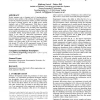Free Online Productivity Tools
i2Speak
i2Symbol
i2OCR
iTex2Img
iWeb2Print
iWeb2Shot
i2Type
iPdf2Split
iPdf2Merge
i2Bopomofo
i2Arabic
i2Style
i2Image
i2PDF
iLatex2Rtf
Sci2ools
101
click to vote
SIGSOFT
2005
ACM
2005
ACM
A case study on value-based requirements tracing
Project managers aim at keeping track of interdependencies between various artifacts of the software development lifecycle, to find out potential requirements conflicts, to better understand the impact of change requests, and to fulfill process quality standards, such as CMMI requirements. While there are many methods and techniques on how to technically store requirements traces, the economic issues of dealing with requirements tracing complexity remain open. In practice tracing is typically not an explicit systematic process, but occurs rather ad hoc with considerable hidden tracing-related quality costs. This paper reports a case study on value-based requirements tracing (VBRT) that systematically supports project managers in tailoring requirements tracing precision and effort based on the parameters stakeholder value, requirements risk/volatility, and tracing costs. Main results of the case study were: (a) VBRT took around 35% effort of full requirements tracing; (b) more risky or...
Requirements Tracing Complexity | Requirements Tracing Precision | SIGSOFT 2005 | Software Engineering | Value-based Requirements |
Related Content
| Added | 20 Nov 2009 |
| Updated | 20 Nov 2009 |
| Type | Conference |
| Year | 2005 |
| Where | SIGSOFT |
| Authors | Matthias Heindl, Stefan Biffl |
Comments (0)

